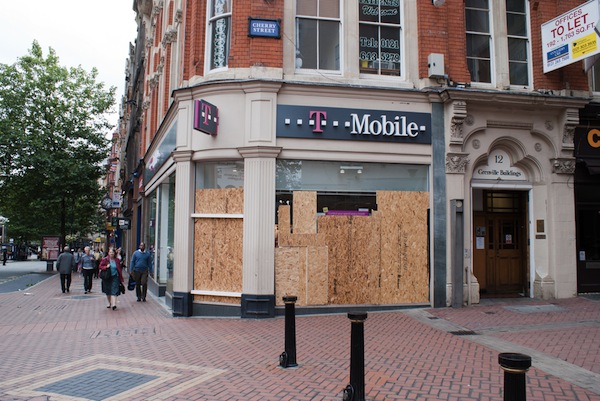
You'd never know that the execs over at AT&T are bitter about the failed T-Mobile USA merger or paying out $3 billion for absolutely nothing.
Yesterday, T-Mobile handed out 1,900 pink slips, mostly to employees working in call centers. Gee, that's not a vital area, now is it? Today, AT&T rallies to T-Mobile's defense, blaming not the nation's fourth-largest carrier but the Federal Communications Commission. AT&T's rationale: The carrier would have preserved those jobs if allowed to buy T-Mobile.
Of course, the blame game accomplishes something else: Absolves AT&T's responsibility. The consequences of a failed merger left T-Mobile limping along. Cutbacks or downsizing of some kind were inevitable. Last month during its quarterly earnings report, T-Mobile acknowledged net loss of 706,000 subscribers.
Stated differently: The failed merger weakened T-Mobile -- that and being the only major carrier without iPhone. But is the merger gone bust the FCC's fault or AT&T's -- or perhaps a little and a lot of both?
You know AT&T's answer to that question. Jim Cicconi, AT&T Senior executive veep of External and Legislative Affairs, posted after market close today:
Yesterday, T-Mobile made the sad announcement that it would be closing seven call centers, laying off thousands of workers, and that more layoff announcements may follow. Normally, we’d not comment on something like this. But I feel this is an exception for one big reason: only a few months ago AT&T promised to preserve these very same call centers and jobs if our merger was approved. We also predicted that if the merger failed, T-Mobile would be forced into major layoffs.
At that time, the current FCC not only rejected our pledges and predictions, they also questioned our credibility. The FCC argued that the merger would cost jobs, not preserve them, and that rejecting it would save jobs. In short, the FCC said they were right, we were wrong, and did so in an aggressive and adamant way.
Rarely are a regulatory agency’s predictive judgments proven so wrong so fast. But for the government’s decision, centers now being closed would be staying open, workers now facing layoffs would have job guarantees, and communities facing turmoil would have security. Only a few months later, the truth of who was right is sadly obvious.
So what’s the lesson here? For one thing, it’s a reminder of why 'regulatory humility' should be more than a slogan. The FCC may consider itself an expert agency on telecom, but it is not omniscient. And when it ventures far afield from technical issues, and into judgments about employment or predictions about business decisions, it has often been wildly wrong.
The other lesson is even more important, and should be sobering. It is a reminder that in government, as in life, decisions have consequences. One must approach them not as an exercise of power but instead of responsibility, because, as I learned in my years of public service, the price of a bad decision is too often paid by someone else.
AT&T did leave T-Mobile with spectrum in 128 markets and $3 billion breakup fee. If data throttling is any indication, AT&T subscribers, and I'm among them, will pay for executives' T-Mobile remorse for some time ahead.
As for the FCC. Did regulators' objection to the merger preserve competition, and jobs, or squash it? You tell me in comments.
Photo Credit: Jonnystockphoto/Shutterstock

